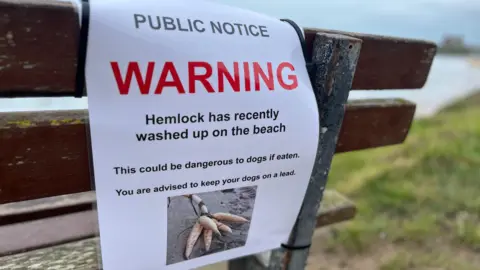Dog owners warned over poisonous plant on beaches
 BBC
BBCDog owners have been warned to avoid some beaches in north Cornwall following reports of washed up hemlock water dropwort roots and reports of pets becoming "very unwell".
The plant, which is often mistaken for parsnip due to its appearance, is poisonous to animals including dogs.
Cornwall Council said sightings of the roots had been reported on Fistral and Little Fistral beaches in Newquay.
A council spokesperson said: "As a precaution, we're putting up signs urging dog owners to be vigilant and keep pets on a lead."
'Avoid area'
They added: "They look and smell like parsnips and can be poisonous to animals.
"The roots are often washed down from riverbanks during the winter."
Newquay Town Council said it had received "a number of calls and messages" about dogs becoming "very unwell" after visiting the Fistral and Little Fistral area.
In a post on Facebook, a town council statement said: "We'd advise avoiding that area with your dogs."
Djamila Bousksou, from Newquay, lost her three-year-old English bull terrier in January following a walk on Fistral Beach.
Hemlock was never confirmed as the cause, but the café owner said vets theorised that her dog, Duke, had passed due to "something toxic".
 Djamila Bousksou
Djamila BousksouMs Bousksou noticed Duke was not feeling himself about six hours after their walk.
She said: "At first it was just lethargy, a bit of vomiting; but it turned into major vomiting episodes and restlessness. He couldn't settle.
"He was definitely in pain and we ended up taking him to the ICU at 03:00 on 2 January, where he was admitted.
"There was a lot of up and downs and his symptoms escalated quite quickly. There was a lot of vomiting and vomiting of blood. It was awful."
Duke spent six days in intensive care, but, due to the damage to his intestines and oesophagus, the decision was made not to prolong his life.
"It's the lack of knowing what happened to Duke that is the hardest thing," Ms Bousksou said.
Follow BBC Cornwall on X, Facebook and Instagram. Send your story ideas to [email protected].
